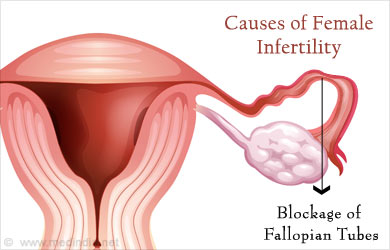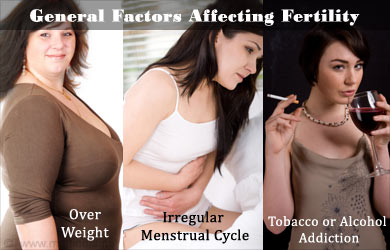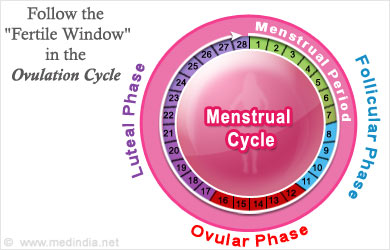- Lifestyle factors and reproductive health: taking control of your fertility - (http://www.ncbi.nlm.nih.gov/pmc/articles/pmc3717046/)
About
A baby is a blessing and a gift from heaven above, a precious little angel to cherish and love. Having a baby is a happy occasion that many couples look forward to. Yet more and more people, both men and women are facing problems with fertility. For many women, not being able to conceive could end up having devastating effects with an overwhelming feeling of depression and disappointment.
We all go through different phases in life. There is a time when one is young and busy with career, when one can’t imagine life with children and then when one have them and can’t imagine life without them. If trying to get pregnant now, or planning to in the future, it is imperative to identify the risk factors that both partner may have, and to inform doctor right away. The sooner one address and treat the problems that may affect fertility, the better are chances of conceiving.

Female fertility is a woman's ability to conceive a biological child. One need to consult health care practitioner if both partners have been trying to get pregnant with frequent, unprotected sex for at least 6 months to one year but without any positive results.
Causes of Female Fertility Problems
- Ovulation disorders, where one ovulates infrequently or do not ovulate at all, such as polycystic ovarian disease (PCOD), premature ovarian insufficiency or hypothalamic dysfunction etc.
- Endometriosis is a condition in which tissue that normally lines the inside of the uterus (endometrium) grows in other locations. If surgical procedure is used for the removal of this extra tissue growth, it could lead to scarring, which potentially could obstruct the tube, thus preventing the egg and sperm from uniting and could also affect the implantation of the fertilized egg.
- Blockage of fallopian tubes, which is most likely caused by an infection such as pelvic inflammatory disease, sexually transmitted diseases such as gonorrhea, syphilis, or chlamydia or certain surgeries like surgery for a ruptured appendix, ectopic pregnancy or ovarian cysts. It is estimated that fallopian tube disease accounts for about 20 percent of all the infertility cases treated.

- Sexually transmitted diseases could be asymptomatic and thus not diagnosed in women. Research shows that 70% of women with chlamydia are not diagnosed with the disease at all. If left untreated, STDs could potentially lead to infertility by causing scarring of the fallopian tubes, ectopic pregnancy as well as other reproductive problems. One of the solutions to reduce this risk is to use latex condoms as well as limit the number of sexual partners.
- Unknown causes like in some cases the underlying cause of infertility can never be found. There could be a combination of several minor factors in both partners; however, they generally get better with time.
General Factors Affecting Fertility
There are many health factors that could affect a woman's ability to ovulate, conceive or successfully carry a pregnancy to full term:
- Age: Age plays a crucial role in female fertility. Since a woman’s biological clock is ticking, delaying pregnancy could decrease the likelihood of conceiving.
- Physical fitness: Being either overweight or underweight could affect a woman’s reproductive cycle. It is a known fact that if the body fat is 10 to 15 percent above normal, it could overload the body with estrogen and on the flipside if it is 10 to 15 percent below normal, then it could drastically affect the reproductive cycle.
- Irregular menstrual cycle: Irregular menstrual cycles such as short, long, or heavy period, which is due to hormonal imbalance can affect ovulation and in turn the fertility.
- Medications: Certain medicines such as antidepressants, antibiotics, painkillers, etc., which are used in the treatment of chronic disorders could affect fertility. However, these are considered temporary.
- Using tobacco or alcohol: Smoking and moderate to heavy consumption of alcoholic drinks could increase the chances of infertility in women.

- Autoimmune disorder: Certain diseases such as diabetes, lupus, thyroid problems and rheumatoid arthritis could interfere with fertility issues.
- Delay of fertility: These days many couples are delaying the process of starting a family mostly because of career issues. Unfortunately, the bitter truth is that fertility and chances of conceiving decreases with growing age for males as well as females. The antioxidant levels in the tissues decreases as age increases.
- Getting married at an older age: This in most cases means contact with more sexual partners and increasing the chances of sexually transmitted diseases, which could potentially damage the fallopian tubes. Older age could also mean more body weight. Studies have shown that obesity decreases fertility rate and increases chances of having a miscarriage.
Natural Ways to Improve Fertility
Herbs for Infertility
After being let down by numerous medical therapies, these days many couples are turning to herbs to help achieve pregnancy. Herbal treatments which use different plant parts such as roots, stems and leaves, bark, flowers etc., come in a variety of dosage forms such as tinctures, pills, powders, infusions and decoctions.
Lady’s Mantle (Alchemilla vulgaris) is used for adjusting the hormonal imbalance in females. It is not only used to treat fertility problems but some fibroids of the uterus, cervix disorders, and irregularity in menstrual cycle, strengthening of the uterine walls. It helps fight infections and pain of the female reproductive organs because of its tannins, which are anti-inflammatory in nature and flavonoids with estrogenic properties.
Black cohosh (Cimicifuga racemosa) is recommended to be taken in the first part of the menstrual cycle to help boost woman’s fertility. It should be avoided in women in whom the contraceptive pill is contraindicated.
Yarrow (Achillea millefolium) is known to cure abnormal menstrual cycles and cramps by dilating the capillaries of the reproductive organs and toning the uterine walls and thus improving the blood supply. It is also known to treat vaginal and urinal infections due to its antiseptic properties.

Shepherd’s Purse (Capsella bursa-pastoris) is known to increase the chances to conceive and carry the pregnancy by toning and strengthening the uterine walls and also by preventing uterine hemorrhages. It also possesses haemostatic and astringent properties, which helps in treating excessive menstrual flow.
Licorice Root (Glycyrrhiza glabra) helps in maintaining appropriate hormonal balance and is also known to fight against the harmful effects of xenoestrogens.
Evening Primrose Oil (Oenothera biennis), is recommended to use this herb until ovulation in women who are trying to get pregnant. It helps in the development of fertilized egg by creating a conducive atmosphere and strengthens the cervix.
Ashwagandha (Withania somnifera) is considered as a good male sexual tonic known to cure impotence and improve fertility. The hopeful father is advised to mix the powder in warm milk and drink one or two cups per day.
Foods to Improve Fertility
Healthy balanced colourful diet: There cannot be a better time than this to improve food habits and up servings of fruits and vegetables. The fitter and healthier, the better are the chances of conceiving. Follow the guidelines of the food pyramid and include various colours of fruits and vegetables. Spinach, green pepper, cucumber, kale top the list in the green colour category whereas in the red it is apples, strawberries and red peppers. For yellow and orange, incorporate bananas, nectarines, lemons and for the blue and purple category, try eggplant, blueberries.
Whole grains: The results of an eight year study conducted in about 18,000 women have shown that foods rich in whole grains, healthy fats, proteins, etc., lead to an improved fertility in women, so go ahead and include plenty of whole grains like wheat, rice, oats, cornmeal, etc., in daily diet.
Omega 3 fatty acids: Many fishes are a rich source of omega 3 fatty acids, which is known to improve fertility. However, to prevent from exposing to the mercury in fish, it is recommended to eat fishes such as catfish, salmon etc., which are known to have little or no mercury. Walnuts, flax seeds and whole grains are also good source. Supplements such as fish oil which contain a mixture of omega 3, omega 6 and omega 9 fatty acids are also beneficial.

Iron: Some studies have shown the beneficial effect of iron in improving fertility. Meat, iron fortified cereals, bean, and asparagus are good sources of iron.
Decaffeinated beverages/alcohol: When trying to conceive, one should limit the amount of tea, coffee or even alcohol, as studies have shown that having too much of these beverages could impair fertility.
Researchers from Sweden have shown that women who drink two alcoholic beverages in a day reduced their fertility by nearly 60%. Drinking in moderation is the key! Switching to the decaffeinated green tea is a good option. However after becoming pregnant, it is recommended to give up alcohol completely to avoid any potential birth defects.
General Tips to Boost Fertility
Maintaining a healthy body weight could boost chances of conception. In other words, being underweight or overweight could delay the time it takes for a woman to conceive. Studies have shown that women with pre-pregnancy BMI of 25-39 (obese women) had a twofold increase in the time to get pregnant. On the other hand, in under-weight women who had a BMI of less than 19, the time to conceive increased fourfold.
Follow the "fertile window" in ovulation cycle to boost chances of pregnancy. The fertile window is typically the six days that end on the day of ovulation. It is seen that chances of pregnancy are highest if having an intercourse within the three days before ovulation. It is also a good idea to keep track of ovulation which is done either by the calendar method, figuring when ovulation occurs about 14 days before the menstrual period is due, or by investing in ovulation predictor kit.

Pick vaginal lubricants wisely. Make sure to avoid lubricants which have spermicidal agents. Try and avoid commercially available water-based lubricants such as Astroglide, KY Jelly and Touch which have the potential to inhibit sperm motility by 60% to 100%.
Avoid exposure to pesticides, since certain pesticides especially agricultural pesticides could harm both men and women's fertility. Also, people working in the printing and dry cleaning need to be aware of the fact that certain chemicals and solvents can adversely affect women's fertility.
Give up smoking. Research clearly shows that smoking could potentially damage eggs, fallopian tubes and alters hormones in men and women. It could also lead to ectopic pregnancy (pregnancy in fallopian tube) and miscarriage.
Increase water consumption to at least 8 glasses per day. If in a habit of drinking soda, then there is a need to cut down on that. Also, try and replace regular tea with decaffeinated green tea, which has tremendous health benefits.
Avoid over exposure to heat sources, especially for men. Studies have shown that exposure to high water temperatures like hot water tubs affects men’s fertility. There are some reports that indicate that exposure to radiation from cell phones could also adversely affect the sperm count in men.
Reduce stress. Studies have shown that undue stress can lower chances of conception. Hence, it is important to minimize stress and practice healthy coping methods like relaxation through meditation and yoga when trying to conceive.
Schedule regular checkups. Make sure to visit health care provider on a regular basis. Doctor can perform tests to identify any health conditions that might threaten fertility.

So, if trying to conceive, remember that baby is already in the heart, it will be someday in arms too. Be positive, have faith and follow the simple guidelines mentioned above and it will happen sooner than one thinks!






